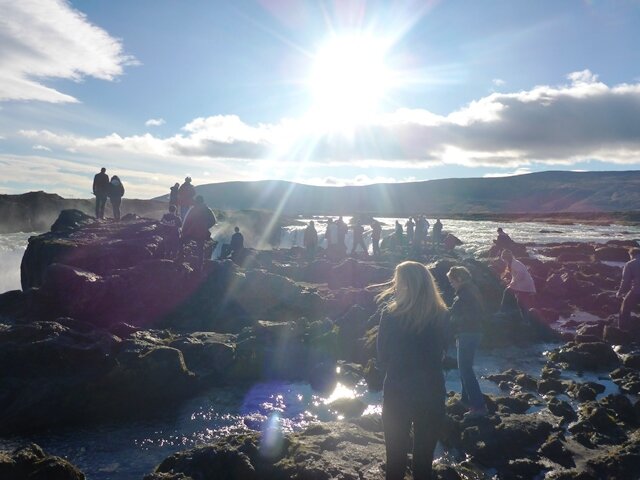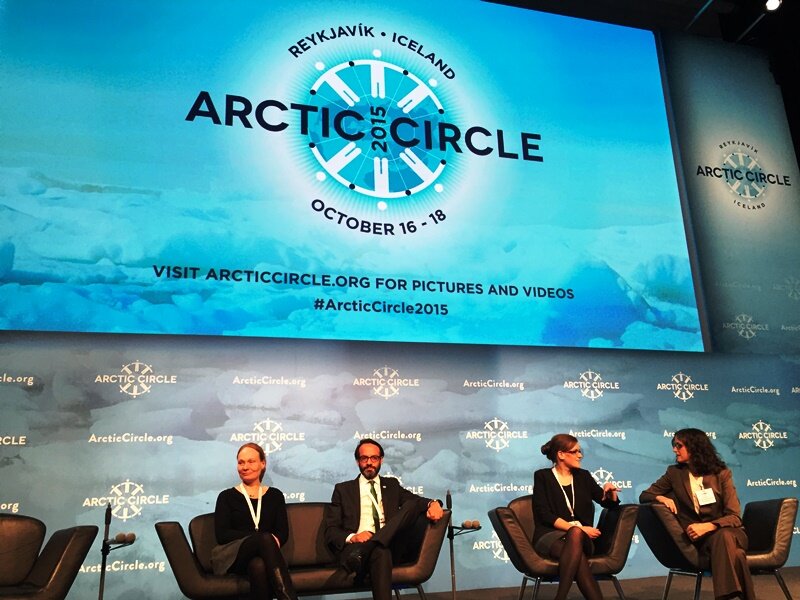PAGE21 Researcher Profiles: Min Jung Kwon
- Details
- Created on Tuesday, 02 April 2013 09:35
This weeks researcher profile introduces Min Jung Kwon from Max Planck Institute for Biogeochemistry.
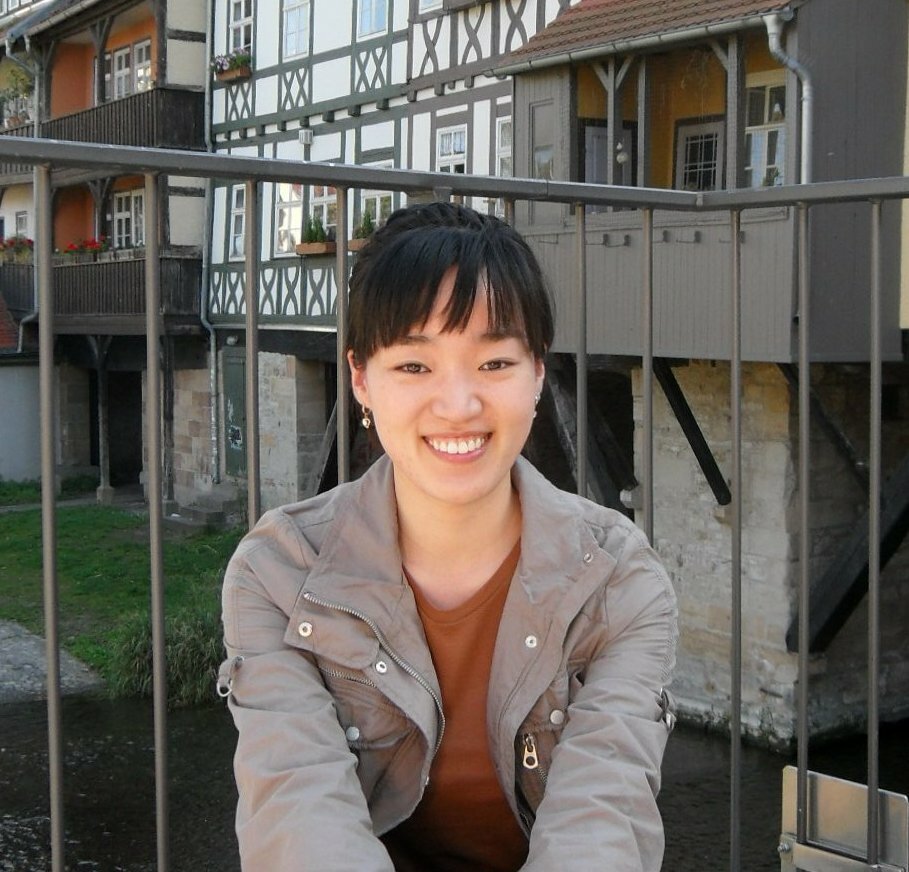 Name
Name
Min Jung Kwon
Institution
Max Planck Institute for Biogeochemistry
Nationality
South Korean
Research Focus
Quantifying carbon flux with soil chambers and correlating it with physical, chemical, and biological soil parameters. Manipulating water level in tussock tundra and investigating its effects on carbon flux.How is your reserach affiliated with the PAGE21 project and what parts of your research will be a direct input to PAGE21?
Carbon flux data can be compared to those from other sites to better estimate global carbon flux in permafrost region. Manipulation experiment will enable us to predict ecosystem response to changing climate conditions.
What is the current challenge within this topic?
The greatest challenges are accurate measurement of flux (a myriad of factors influence carbon flux over a highly heterogeneous terrain, and flux data vary with measuring equipment) and discontinuous dataset through the year (most studies are done only in growing seasons, and there is nearly no data from the winter season).How did it happen that you became a researcher?
I just chose what I wanted to do every moment, and now I find myself becaming a researcher.Why do you like being a researcher?
It is fun to learn something new and discover unexplored scientific world. (Sounds a little nerdy)What do you like most in being a researcher?
I like to be in the nature. As a field/experimental researcher, I can go out to the nature pretty often rather than sit at the desk all day long all year around. Moreover, the more I know about the nature, the more I love it.How a typical working day looks like?
It depends on the stage of a project. Now, the project has just started so I spend most of my time researching on previous studies and planning for the summer sampling this year. During the summer season, I will go to Siberia to measure carbon flux and after that I will do some lab experiments, analyze data, and again plan for another sampling trip for the following year. When sufficient data are collected, I will write some papers on findings.Funniest response ever when you told somebody that you are a "polar researcher"?
Are you going to Germany for your PhD and going to Siberia for the research? Why??What are your plans for the upcoming three / five years?
I started my PhD studies a few months ago, so I will keep researching here for the next three or four years.Which expeditions do you participate this year and what is going to be their focus?
We will go to Northeastern Siberia (near Cherskii) during the summer season. The research group will set up an eddy covariance tower, select some spots for chamber measurements, and start collecting data. This is the first journey to Siberia for us, so we will see how it goes...Prof Dr. Hans-Wolfgang Hubberten presented the PAGE21 project at the 25th International Polar Meeting in Hamburg
- Details
- Created on Monday, 25 March 2013 12:26
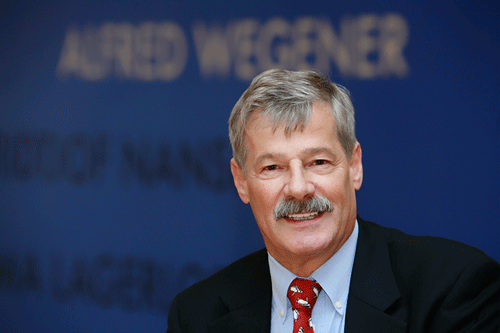 The German Society of Polar Research (DGP) held 25th International Polar Meeting with the topic of "Polar Regions in Transition" in 17-22 March 2013 at the University of Hamburg (UHH).
The German Society of Polar Research (DGP) held 25th International Polar Meeting with the topic of "Polar Regions in Transition" in 17-22 March 2013 at the University of Hamburg (UHH).
The Meeting was organized by the DGP in cooperation with the University of Hamburg, the Alfred Wegener Institute for Polar and Marine Research and the Climate Campus Hamburg.
The main theme of the Meeting was the major changes taking place in the polar regions due to the climate change.
PAGE21 Project Coordinator Prof Dr. Hans-Wolfgang Hubberten held a presentation at the Meeting with a title "Die Erwärmung der Arktis und ihre Auswirkungen auf die PermafrostLandschaften" or Arctic warming and its impact on permafrost landscapes.
The Abstract of the presentation can be seen here.
More information on the 25th International Polar Meeting can be found here.
PAGE21 Researcher Profiles: Christian Juncher Jørgensen
- Details
- Created on Saturday, 23 March 2013 09:32
We will continue introducing the researchers of the PAGE21 project by introducing this weekend Christian Juncher Jørgensen from the Department of Geoscience and Natural Resource Management in University of Copenhagen
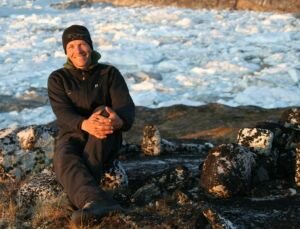 Name
Name
Christian Juncher Jørgensen
Institution
Department of Geoscience and Natural Resource Management, University of Copenhagen
Nationality
Danish
Research Focus
My research revolves around the studies of elemental transformations in soil and terrestrial ecosystems. I am particularly interested in the study of biogeochemical processes responsible for both the production and consumption of carbon and nitrogen compounds in the soil, as well as quantifying the net impacts on the nearby environment.Affiliation with the PAGE21 project
My research within PAGE21 is part of WP3 where we investigate the belowground organic carbon (C) and nitrogen (N) pools and biogeochemical turnover in permafrozen soil and their partitioning in the landscape at the primary field sites in Siberia, Svalbard, Greenland and Sweden.
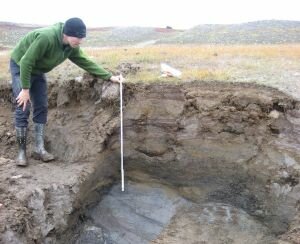 What is the current challenge within this topic?
What is the current challenge within this topic?
The greatest challenge involved in my research is to get a solid understanding of the quantity and lability of the carbon pools currently immobilized in permafrozen soil. In particularly, we need to establish a good understanding on how future warming might affect the mobilization of labile C and N pools in the soil, which may be lost from the terrestrial ecosystems to the atmosphere as greenhouse gas emissions. The big unknown is really how much of and at which rate the total C and N buried in the permafrost will be susceptible for degradation and remobilization.
General Researcher Questions
General Researcher Questions
How did it happen that you became a researcher?
It's the best job in the world!
Why do you like being the researcher?
Because of the fascination of unraveling nature's hidden secrets.
What do you like most in being a researcher?
Working in the field and getting lost in some interest process or experiment and suddenly realizing that another day-at-the-office went by without noticing it. And then we even get paid to do it :)
What are your plans for the upcoming three to five years?
Hopefully being able to expand my research into more regions and research areas, while expanding my collaboration and research network with fascinating scientists.
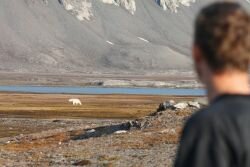 Which expeditions do you participate this year?
Which expeditions do you participate this year?
In 2013, field work will be focused on obtain material for C and N lability determinations in Tiksi and Samoylov Island.
What do you usually miss the most when being on the field?
Good coffee when I run out of propane gas for my little espresso field stove. Apart from this, I'd better say my wife and 3 kids, or they will not let me go again ;)
What is your most interesting experience so far on expedition?
Running into a polar bear at Kapp Lineé, Svalbard was an exciting moment!
Dr. Julia Boike in German "women in EU research" online publication
- Details
- Created on Tuesday, 19 March 2013 12:14
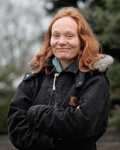 The European Bureau (EU office) of the German Federal Ministry of Education and Research introduces Dr. Julia Boike in its FiF portret series this month.
The European Bureau (EU office) of the German Federal Ministry of Education and Research introduces Dr. Julia Boike in its FiF portret series this month.
FiF stands for "women in EU research" and contributes to increasing the proportion of women in research and development and identifies opportunities that Europe offers scientists.
Dr. Boike's portrait can be found in HERE. And the FiF website can be found HERE.
Unfortunately only in German
2nd Circular now out for the "Global Warming and the Human-Nature Dimension in Siberia" Conference
- Details
- Created on Monday, 25 February 2013 08:48
Second circular
2nd International Conference
Global Warming and the Human - Nature Dimension in Siberia:
Social Adaptation to the Changes of the Terrestrial Ecosystem,
with an Emphasis on Water Environments
Yakutsk , Russia , 8 - 1 1 October , 2013
To be held and co-organized with the
7th Annual International Workshop
C/H2O/Energy balance and climate over boreal and arctic regions
with special emphasis on eastern Eurasia
Purpose
Global warming will likely transform Siberian environments. Early evidence indicates that carbon and hydrologic cycles are undergoing rapid change, with potentially grave impact s on Siberian flora and fauna. Human populations, which have adapted to great changes in social structure and environment in the past, will be forced to adapt again, but in this case to an unprecedented sequence of cascading environmental changes.
In 2013 we commemorate 60 years since starting field experimental works at the scientific station "Spasskaya Pad" of IBPC SD RAS. At present, the station is rightfully considered to be a regional research outpost on the study of environmental and global climate changes in the cryolithzone.
This conference will examine three aspects of climate-related environmental change: 1) current and likely future variations in water and carbon cycles ; 2) ongoing field observations and modeling studies of the effects of carbon and hydrologic variability in Eastern Siberian landscapes, and key feedbacks, exchanges and driving forces associated with these effects; and 3) the distinct social-economic impact of climate change on multi-ethnic Siberian societies , and their potential capabilities for adapt ation to projected change sin climate and terrestrial ecosystems.
Contributions on these three aspects , or on the following key themes, are welcome .
Key themes
a) Physical and plant physiological processes of C/H2O/Energy cycles in Siberian ecosystems
b ) Forest and tundra ecosystem structure related to C/H 2O/Energy cycles
c ) Permafrost/cold climate processes and their impacts on C/H2O/Energy cycles
d) Usage of satellite remote sensing technique s and the evelopment of C/H2O/Energy cycle models
e) Interaction between wild/domesticated animals and terrestrial vegetation
f) Vulnerabilities of landscapes, human systems, and infrastructures inpermafrost areas
g) Ethnographic accounts of human - nature relations in conjunction with climate change
h) Local knowledge of, adaptationstoand policies for responding to the changing climate
i) Research status, cooperative arrangements, and plans for the future
Schedule
Conference: 8-10 October 2013 (Lecture Hall, National Academy, Yakutsk and Conference Hall, IBPC)
Reception: 8 October 2013
Excursion: 11 around Yakutsk city
Pre-registration:
Please, register before March 30, 2013.
Contributions to the Buy Cialis conference
-Oral presentations (20 minutes followed by 10 minutes of discussion)
-Poster presentations: The participants should send the following information by e-mail to < This email address is being protected from spambots. You need JavaScript enabled to view it.
.r">This email address is being protected from spambots. You need JavaScript enabled to view it.
.ru >
a) Name:
b) Affiliation including address:
c) Nationality:
d) Presentation: Oral or Poster or no presentation
e) Title of presentation (if applicable):
f) Participation for the excursion: Yes or No
Abstract and Proceedings
If you intend to contribute an oral or poster presentation, please send a short abstract (max. 300 words) to the address, no later than March 30, 2013 . Proceedings the conference will be published. For the proceedings, you are requested to prepare an extended abstract (max. 4 pages) which should be submitted to the address above, no later than October 1, 2013. Formatting guidelines will bedescribed in following circulars.
Fee
Conference : 100 USD (including coffee, tea, a reception)
Excursion : 80 USD (including transportation fee and simple lunch)
Travel and accommodation
IBPC can be reached from Yakutsk International Airport, followed by local transport in Yakutsk . Accommodations will be arranged except for Russian participants . Normal hotel prices start at 43 USD for a single room .
Organizing committee
Trofim MAXIMOV, IBPC & NEFU
Takeshi OHTA, GSBS, NU
Tetsuya HIYAMA , RIHN
Atsuko SUGIMOTO, FEES , HU
Maxim TROFIMOV, SCSIP
Evgeny MIKHAYLOVA, NEFU
Vyacheslav POPOV, SDFR
Vanda IGNATIEVA , IHIPN
Sardana BOYAKOVA, IHIPN
Han DOLMAN, VUA
Eddy MOORS , WUR
Alexander KONONOV, IBPC & NEFU
Alexandr ISAEV, IBPC & NEFU
Alexander FEDOROV, MPI & NEFU
Some a bbreviations
IBPC - for Biological Problems of Cryolithozone, Siberian Branch of the Russian Academy of Sciences ,
IHIPN - Institute of the Humanities and the Indigenous Peoples of the North, Siberian Branch of the Russian Academy of Sciences , Russia
MPI - Melnikov Permafrost Institute, Siberian Branch of the Russian Academy of Sciences , Russia
NEFU - North-Eastern Federal University , Russia
RIHN - Research Institute for Humanity and Nature, Japan
FEES HU - Faculty of Environmental Earth Science, Hokkaido University , Japan
GSBS NU - Graduate School of Bioagricultural Sciences, Nagoya University, Japan
VUA - Vrie University of Amsterdam , The Netherlands WU R - Wageningen University , The Netherlands
SCSIP - State Committee on Science and Innovation Policy of the Republic of Sakha (Yakutia) , Russia
SDFR - Department of Forest Relations of the Republic of Sakha(Yakutia ), Russia
Contact persons for the Conference
Dr. Trofim MAXIMOV, e-mail: This email address is being protected from spambots. You need JavaScript enabled to view it.
Tel /Fax : +7 (411) 233 58 97 (office) Mobile: +7 914 235 5354
Dr. Alexander KONONOV, e-mail: This email address is being protected from spambots. You need JavaScript enabled to view it.
Mobile: +7 9 1 4 2 711 998



